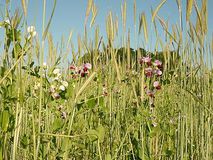Winter Pea at Cereal Breeding Research Darzau
Generally pea crop is susceptible for several biotic and abiotic stresses like Ascochyta disease, weed and lodging. Breeders developed semileafless and short plant types which have a high standing ability but under organic conditions weed is growing through the open canopy structure of a semileafless and short stand. Usually modern pea plants are white flowering but coloured flowering pea type are showing better field emergence and vigour. There are many questions left what kind of pea type is best adapted for organic conditions. Through field test and new crossings Cereal Breeding Research Darzau and their project partners are about to develop new pea types for organic sector.
An unique kind of pea are winter peas. Winter peas are sown in autumn between Mid of September until Mid of October. Winter pea are overwintering in a small growth stage 22 up to 40 (UPOV TG/7/10) over the surface but in the soil root growth and nodulation keeps still ongoing. Due to the fully developed root system in spring winter peas are able to overcome periods of spring and early summer drought. Winter peas have also shown higher nitrogen fixation and vigour. These advantages makes winter peas more preferably to grow on poor sandy soils then spring sown peas.
Winter pea projects:
-
Developing winter pea nursery in intercropping with cereals
-
Testing of winter peas in mixture and intercropping with cereals, rape and turnip - link to project partner University of Kassel
-
Testing seed density of peas and cereals
-
Testing different sowing dates
-
Testing disease resistance of different progeny lines and cultivars - link to project partner University of Kassel
